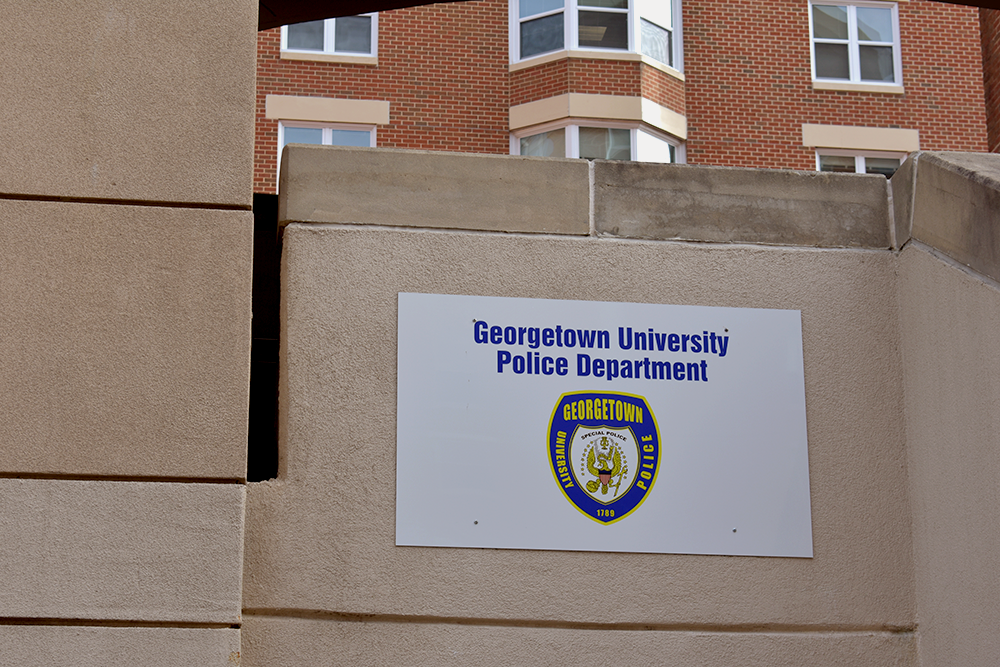Reports of stalking and burglary incidents in on-campus, nonresidential buildings have nearly doubled in the last year, according to the Georgetown University Police Department’s 2019 Annual Security Report.
The report documents that total reported on-campus stalking incidents increased over the past year to 17 reported incidents in 2018, up from 11 reported incidents in 2017. Stalking is defined as any conduct, including unwelcomed communication or surveillance, directed at an individual that puts a person in fear for their safety, makes them feel alarmed or causes them emotional distress, according to the report.

Among reported stalking incidents, stalking in nonresidential buildings saw the highest increase, with 13 reported incidents in 2018 compared to seven reported incidents in 2017. GUPD sent the report to the Georgetown University community in a Sept. 30 email.
The increase in reported incidents of stalking on campus may not necessarily reflect heightened safety risks, according to Jen Luettel Schweer, associate director for Health Education Services and director of Sexual Assault Response and Prevention Services. Rather, the uptick could stem from students having a better understanding of the reporting process, according to Schweer.
“An increase in numbers around issues like stalking and sexual violence often reflects an increase in knowledge about these issues and in reporting,” Schweer wrote in an email to The Hoya.
GUPD releases the safety report annually to the Georgetown community to address both campus and personal safety. The report also includes the last three years’ number of reported incidents of statutory rape, domestic violence and disciplinary referrals for drugs and alcohol, among other types of incidents.
The report contains data on reported crimes that occurred on the main campus as well as at the Georgetown Law Center, School of Continuing Studies and university campuses in Florence, Qatar and London, in addition to general information on university policy and reporting procedures.
Forty-six total reported on-campus burglary incidents were reported in 2018, compared to 31 on-campus burglary incidents in 2017, according to the report. The breakdown of on-campus burglary incidents shows the number of on-campus, nonresidential related burglaries almost doubled, with 27 reported incidents in 2018 compared to 12 reported incidents in 2017.
Though the total number of on-campus burglaries increased over the last year, the number of on-campus residential related burglaries remained at 19 for the second year in a row.
GUPD did not respond to multiple requests for comment.
Though the number of reported burglary incidents at on-campus residential buildings has not changed in the last year, students should continue to be aware of their surroundings and take precautionary measures, according to Executive Director of Residential Education Ed Gilhool.
“Students are encouraged to always lock their doors and to never leave personal belongings, including laptops and cell phones, unattended,” Gilhool said in an email to The Hoya.
In addition to the annual security report, the university also released the Annual Fire Safety Report and Fire Statistics that provides information about fire safety at Georgetown. The report includes statistics on fires at the university and outlines university policies and procedures.
Eleven reported on-campus rapes have been reported for each of the last three years, according to the security report. Though organizations like Sexual Assault Peer Educators work to break the stigma about reporting sexual assaults, the statistics in the report suggest there are students who choose not to report rape for their own personal reasons, SAPE member Courtney Smith (COL ’21) wrote.
“Although I think we are making strides in changing the stigma around reporting rape, there is still much to be done,” Smith wrote in an email to The Hoya. “The fact that the total number of on-campus rapes has stayed the same for the past three years makes me think that there are survivors who have, for their own valid reasons, not reported.”
Georgetown requires all incoming students to complete online educational programs that educate students about on-campus resources and bring awareness to sexual misconduct, according to the report.
In addition to completing online training courses, all new undergraduates attend Hoya RealTalk, a theater production put on by HES during New Student Orientation. The play touches on themes relating to bystander intervention, mental health and alcohol consumption.
For students affected by interpersonal violence, HES provides students support and advice to help ensure their safety, according to Schweer.
“In Health Education Services, we work with students who have experienced stalking, sexual assault and any other form of interpersonal violence by offering them support, advocacy, safety planning and connecting them with any other resources they may need,” Schweer wrote in an email to The Hoya.




















